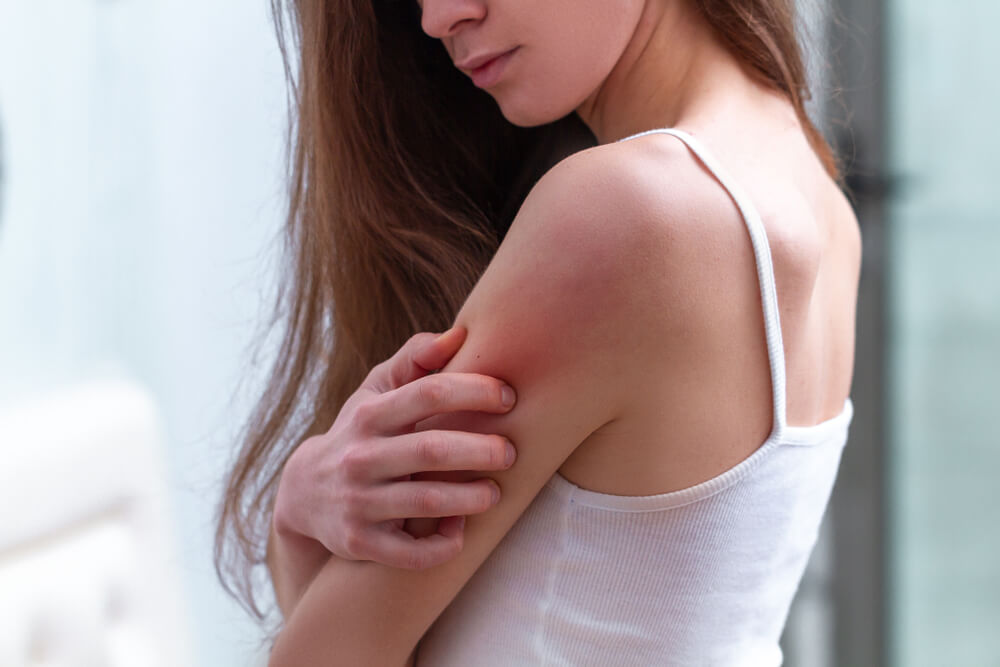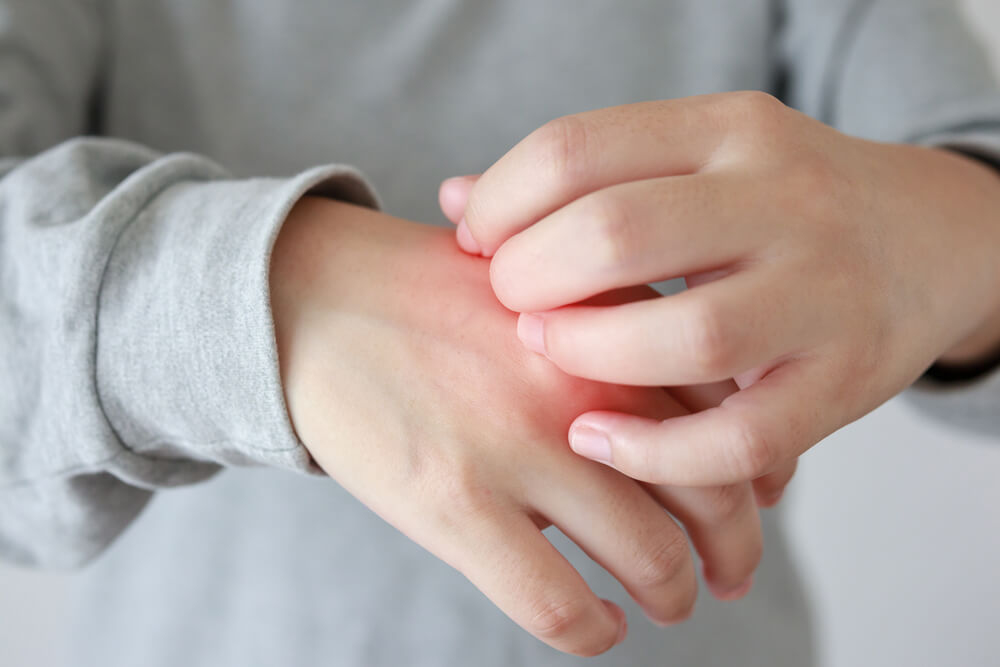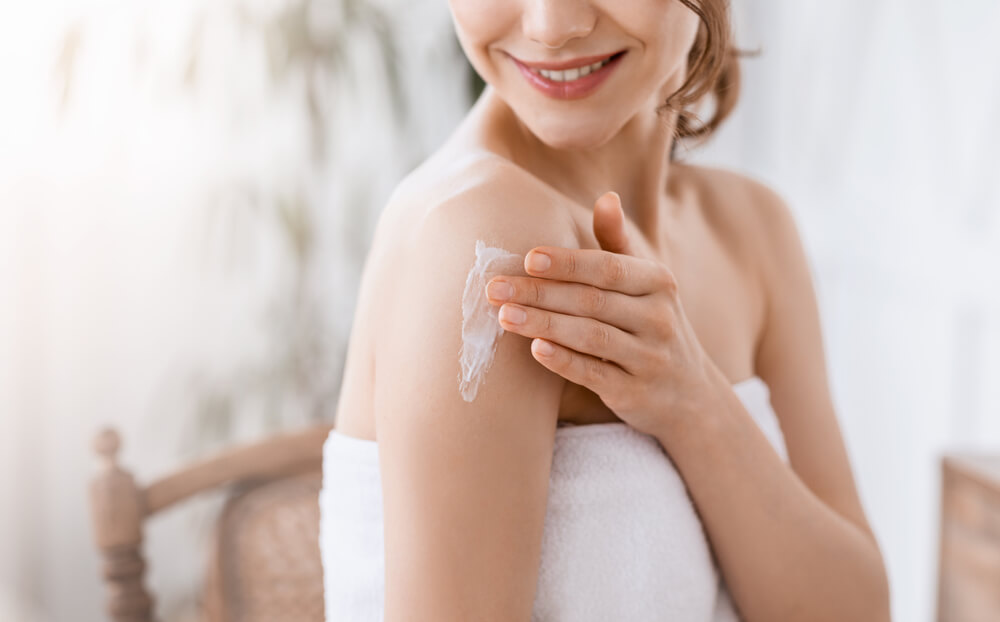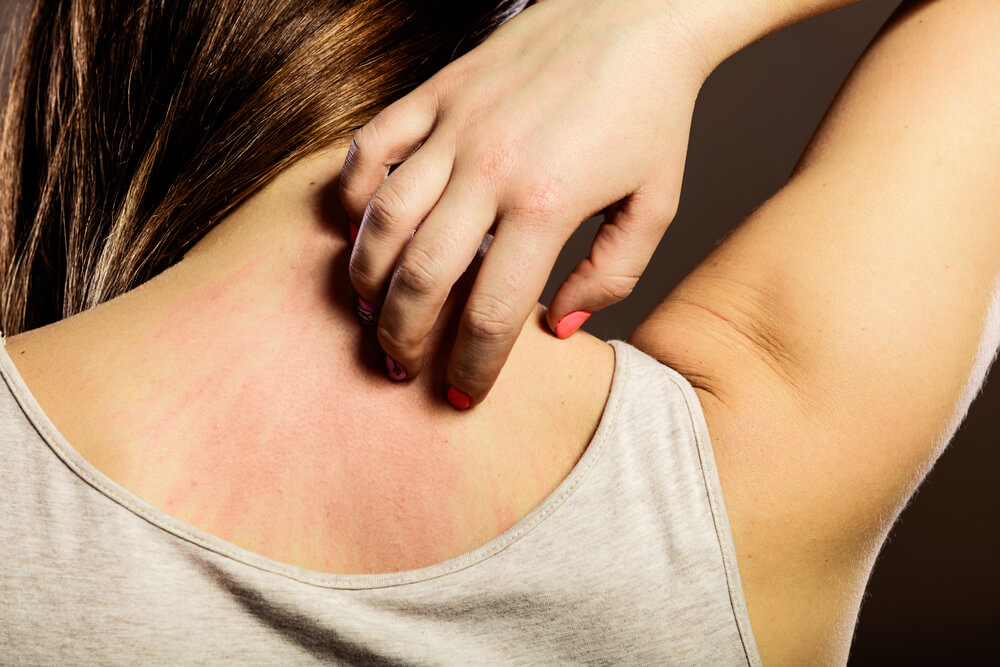Everyone feels itchy once in a while. Itching is commonly described by the feeling it evokes. At times, people describe it as the feeling of something crawling on your skin that makes you want to scratch yourself.
Medically, itching is called pruritus. When it becomes frequent and lasts for more than six weeks, you can consider it a chronic itch. Chronic itching is unpleasant and can be a nuisance to your day-to-day activities. Before it gets worse, it’s important to relieve it or, better yet, prevent the feeling of itchiness from happening.
When it comes to relieving the feeling of itchy skin, it all boils down to addressing the source of the irritation. For example, triggers could include bedbugs, irritating fabric, or underlying conditions such as allergies.
Having itchy skin, just like fevers, is often a symptom of other conditions. Some itches can be remedied at home, but trickier cases may require you to take a trip to the drugstore or see your dermatologist.
What Causes Itchy Skin?

There are many reasons for itchy skin. Itchiness is often a symptom of an underlying condition or external stimulus. Here are some common reasons for itchy skin:
- Dry skin – skin lacks moisture and is usually temporary
- Bug bites (from mosquitoes, fleas; mites can cause scabies)
- Head lice cause itchiness on the scalp
- Skin conditions – Numerous skin conditions cause itching. Some of these skin conditions are:
- Atopic dermatitis
- Folliculitis
- Chickenpox
- Eczema
- Hand-foot-and-mouth disease
- Hives
- Ringworm
- Athlete’s foot
- Psoriasis
- Neurodermatitis
- Seborrheic dermatitis
- Shingles
- Skin cancer
- Internal diseases – Chronic itching can be a symptom of internal diseases like Hodgkin’s lymphoma or cutaneous T-cell lymphoma. People who suffer from advanced kidney disease may experience intense itching too. Some other internal diseases that cause itching are as follows:
- Diabetes
- Liver disease
- HIV
- Overactive thyroid gland
- Allergies – Allergies often come with itchiness and cause rashes. Makeup contains chemicals that can cause allergies. Thus, choosing and putting on makeup should be done carefully to avoid allergic reactions that can make your face itchy. Your metal clothes hooks have nickel, which is another example of a substance that can trigger allergies for some people.
- Aging causes changes in the skin like wrinkling and thinning. As the collagen and moisture in our skin decrease, the drier our skin becomes. Dry skin is more likely to itch.
- Nerve problems – Itches can occur due to nerve damage. Itches caused by this trigger don’t manifest rashes. Shingles, stroke, and multiple sclerosis are some of the diseases that can cause nerve damage.
- Weather conditions – Our skin can lose its natural oils under cold weather conditions. Low humidity and high winds can also contribute to loss of moisture.
- Medication – Opioids and aspirin are some of the drugs that have itching as a side effect.
- Bathing too much – Believe it or not, over bathing is a thing. Bathing too much can wick away the body’s natural oils. Consequently, this decreases the body’s moisture and allows for your skin to become dry and itchy.

- Plants or marine life – When you think of plants and itchiness, poison ivy probably comes to mind. Although poison ivy is certainly the most famous plant associated with itching, it’s not the only plant that can cause nasty itching spells. Here are some common plants that can also cause itching:
- Strawberry
- Tomato
- Garlic
- Borage
- Comfrey
- Rose hip
- Peppers
- Tulip bulbs
- Daffodil bulbs
- Hyacinth bulbs
More harmful plant species are listed below. It is important to note that, as much as possible, we must not touch these plants:
- Giant hogweed
- Poison hemlock
- Poison sumac
- Cow parsnip
- Wild parsnip
- Poodle-dog bush
- Nettle
- Poison oak
- Spotted water hemlock
Common Areas Of Itchiness

Itching may be generalized all over the body or localized to certain areas depending on the cause of the itch. Once in a while, itching manifests with rashes. Itching may also coexist with other symptoms, especially when the patient has underlying skin conditions or internal diseases.
For example, itching may be localized in the crotch area if the patient has a yeast infection. It can be localized to certain areas with nerve damage as well. On the other hand, generalized itching can occur when you experience allergic reactions.
Whether generalized or localized, you must not ignore it and immediately track its causes for appropriate treatment.
Itching can be most noticeable at night before sleeping. For severe conditions, the feeling of itchiness may persist all throughout the day.
How Are Skin Conditions Diagnosed?
Similar to other conditions, finding out the cause and addressing it is key to relieving your itch. Thus, it is important to know how to track your triggers. The process of tracking down what’s inducing the itch can take time and involve several medical exams. Medical exams are administered as the doctor sees fit. You may undergo the following tests for diagnosis:
- Blood test – Blood-related diseases can cause itching. Blood test can determine whether or not an internal disease is triggering your itch.
- Thyroid, liver, and kidney function tests – Diseases that involve these organs may be the root of itching. You may ask your doctor about these function tests if you are experiencing persistent itching alongside other specific symptoms.
- Chest X-rays – Enlarged lymph nodes are another example of an internal condition that can cause itching. Chest X-rays can track down swollen lymph nodes.
- Medical history examination – You may be asked to disclose your medical history for the doctors to better assess your situation.
What Can I Do To Relieve Itchy Skin?

Itching is an uncomfortable sensation. Here are some tips to soothe it:
Apply a Cold Compress
Do this on the affected area for 10 minutes until the itch subsides.
Moisturize Your Skin
It is important to note that you should choose a moisturizer with no dyes, additives, and fragrances. Make sure to use a hypoallergenic moisturizer to prevent allergic reactions. Placing your moisturizer in the refrigerator can add a cooling effect to it, which increases the soothing sensation.
Take an Oatmeal Bath
This can soothe skin conditions that include blistering and pus.
Apply Topical Anesthetics
Apply a topical anesthetic with pramoxine, an anti-itch substance.
Apply Corticosteroid Creams and Ointments
If you have chronic itchiness, you can follow this bedtime routine: bathe in lukewarm water for 20 minutes, apply triamcinolone 0.025%-0.1% ointment on your wet skin. Wear comfortable and loose pajamas. This routine helps keep the skin moist and absorbent for medication.
Apply Cooling Agents
Use products with menthol or calamine.
Undergo Phototherapy
It can be helpful in soothing itchy skin. During phototherapy sessions, the skin is exposed to a specific type of light. It is a good alternative for people who can’t take certain topical or oral medications. Consult your doctor about this treatment method.
Avoid Scratching Your Skin
This will further irritate your skin and may cause wounds to open.
Don’t Use Shampoos with a High Chemical Content
Using over-the-counter medicated shampoos containing zinc pyrithione, ketoconazole, selenium sulfide, or coal tar may help treat a dry and itchy scalp. Make sure to use shampoos that aren’t too fragrant and chemically strong.
Best Practices for Preventing Itchiness

While there are ways to relieve itchiness, prevention is still better than having to treat it constantly. To prevent itching in any part of your body, here are some practices you can include in your skincare routine:
Take Baths with Cool or Lukewarm Water
Try to limit your bath time to 10 minutes. Take a bath once or twice a day only, as overbathing can wick away your skin’s moisture.
Maintain Good Hygiene
Although overbathing can cause dry skin, not bathing at all can cause itching as well. It can also worsen different skin conditions to the point of infection, as it creates an ideal environment for parasites to multiply. Skipping baths can worsen conditions like eczema.
Use Hypoallergenic and Fragrance-Free Products
Avoid using lotions, soaps, and detergents that have high chemical content to prevent itching.
Follow Your Dermatologist
When doing skincare, follow the process prescribed by your dermatologist. Especially for cases where you have to apply medications, the order in which you use products on your skin may matter, so make sure you follow instructions.
Wear Loose, Cotton Clothes
We’ve all heard the term “itchy sweater” before. Wool and other textured fabric may bring about itching.
Avoid Extreme Temperature Changes
To keep your skin healthy, it is good to stay in environments that are cool and have neutral humidity. Using a humidifier during winter can help if you’re prone to having dry skin.
Gently Pat Yourself to Dry Your Skin
Vigorous rubbing can take away moisture or damage your skin.
When Should I Make An Appointment With My Dermatologist?

Normally, itchy skin should subside within weeks if you follow a skincare regimen and apply medication diligently. Itching may usually disappear on its own, or it would only take you a few trips to the drugstore to get over-the-counter medicines for your treatment. When itching persists, and skincare routines do not alleviate the discomfort, you should see your doctor.
You will most likely see your family doctor or primary care doctor for your condition first. For more specialized cases, your family or primary care doctor may refer you to a dermatologist. For itching that totally distracts you from your daily activities and can potentially cause skin damage, you should see your dermatologist as soon as you can.
What Are Some Products I Can Use to Relieve That Itchy Feeling?
Dry skin is a common cause of itchiness. Luckily, there are a lot of products that you can use to prevent the feeling of dry skin. Some products that you can use to soothe the feeling of itching by keeping your skin moisturized are:
- Celestolite Venus Facial Peel – This peels away stubborn makeup and dirt on your face. With proper cleansing, your skin should feel fresh and itch-free
- Celestolite Hand And Body Cream – Made for all skin types, this moisturizer leaves your skin feeling smooth to the touch.
- Celestolite Revitalizing Body Butter – This body butter helps restore moisture by soothing and smoothing away the look of dryness. Using this product gives your skin a velvety-soft finish.
- Luna Luminous Touch – If you’re a fan of the matte finish, then this product is the perfect moisturizer for you. Infused with retinyl palmitate and other botanical ingredients, this moisturizer can help smoothen out the look of your skin.
- Nova Bright Skin Cream (SPF 30) – This daytime moisturizer is perfect for those who are often exposed to the sun. While keeping your skin feeling hydrated and cool, this cream also protects your skin from UV ray damage.
- Venus Night Cream – The Venus Night Cream is a moisturizer that’s specially formulated to reduce the appearance of wrinkles and fine lines.
Avoid the Itch, Live Comfortably
Itchy skin is definitely a hassle. Fortunately, you don’t need to take a trip to the doctor every time you’ve got an itch. You can soothe and prevent that itchy feeling with a variety of methods and products.
Itchy skin is a symptom that has various triggers. Getting to the bottom of things and finding the root of the itching is key to ridding yourself of the condition. It’s important to also maintain healthy skincare habits to prevent your skin from itching.
When your condition doesn’t get better and when it hinders you from daily activities, that’s when you seek out medical advice from your doctor. Having itchy skin can be annoying and uncomfortable, but it’s definitely a symptom that you can control with patience and good habits.




1 comment on “How to Soothe the Feeling of Itchy Skin ”